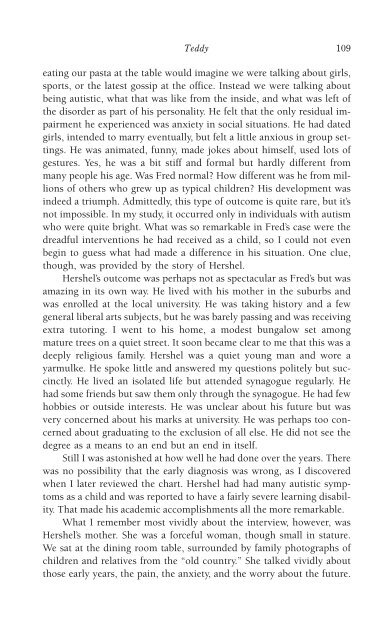978-1572305441
autism
autism
Create successful ePaper yourself
Turn your PDF publications into a flip-book with our unique Google optimized e-Paper software.
Teddy 109<br />
eating our pasta at the table would imagine we were talking about girls,<br />
sports, or the latest gossip at the office. Instead we were talking about<br />
being autistic, what that was like from the inside, and what was left of<br />
the disorder as part of his personality. He felt that the only residual impairment<br />
he experienced was anxiety in social situations. He had dated<br />
girls, intended to marry eventually, but felt a little anxious in group settings.<br />
He was animated, funny, made jokes about himself, used lots of<br />
gestures. Yes, he was a bit stiff and formal but hardly different from<br />
many people his age. Was Fred normal? How different was he from millions<br />
of others who grew up as typical children? His development was<br />
indeed a triumph. Admittedly, this type of outcome is quite rare, but it’s<br />
not impossible. In my study, it occurred only in individuals with autism<br />
who were quite bright. What was so remarkable in Fred’s case were the<br />
dreadful interventions he had received as a child, so I could not even<br />
begin to guess what had made a difference in his situation. One clue,<br />
though, was provided by the story of Hershel.<br />
Hershel’s outcome was perhaps not as spectacular as Fred’s but was<br />
amazing in its own way. He lived with his mother in the suburbs and<br />
was enrolled at the local university. He was taking history and a few<br />
general liberal arts subjects, but he was barely passing and was receiving<br />
extra tutoring. I went to his home, a modest bungalow set among<br />
mature trees on a quiet street. It soon became clear to me that this was a<br />
deeply religious family. Hershel was a quiet young man and wore a<br />
yarmulke. He spoke little and answered my questions politely but succinctly.<br />
He lived an isolated life but attended synagogue regularly. He<br />
had some friends but saw them only through the synagogue. He had few<br />
hobbies or outside interests. He was unclear about his future but was<br />
very concerned about his marks at university. He was perhaps too concerned<br />
about graduating to the exclusion of all else. He did not see the<br />
degree as a means to an end but an end in itself.<br />
Still I was astonished at how well he had done over the years. There<br />
was no possibility that the early diagnosis was wrong, as I discovered<br />
when I later reviewed the chart. Hershel had had many autistic symptoms<br />
as a child and was reported to have a fairly severe learning disability.<br />
That made his academic accomplishments all the more remarkable.<br />
What I remember most vividly about the interview, however, was<br />
Hershel’s mother. She was a forceful woman, though small in stature.<br />
We sat at the dining room table, surrounded by family photographs of<br />
children and relatives from the “old country.” She talked vividly about<br />
those early years, the pain, the anxiety, and the worry about the future.



